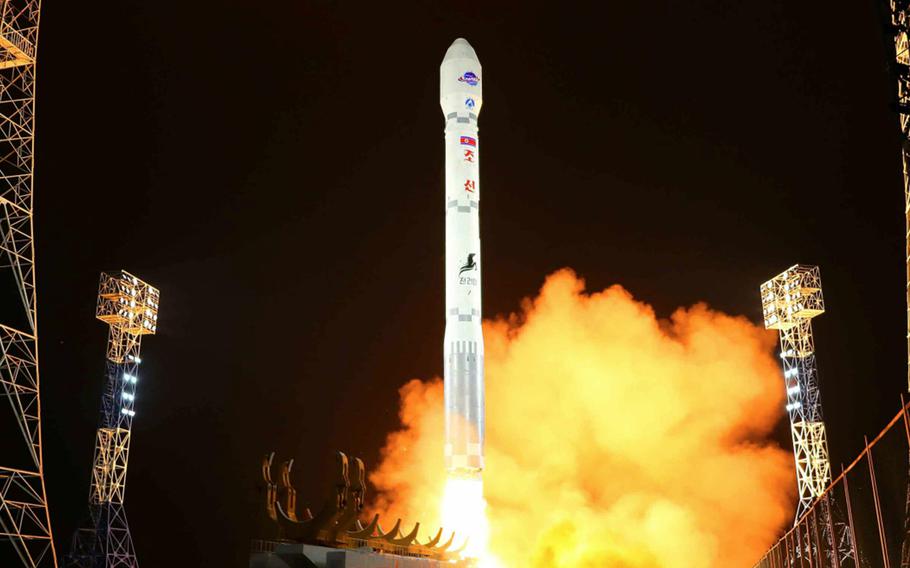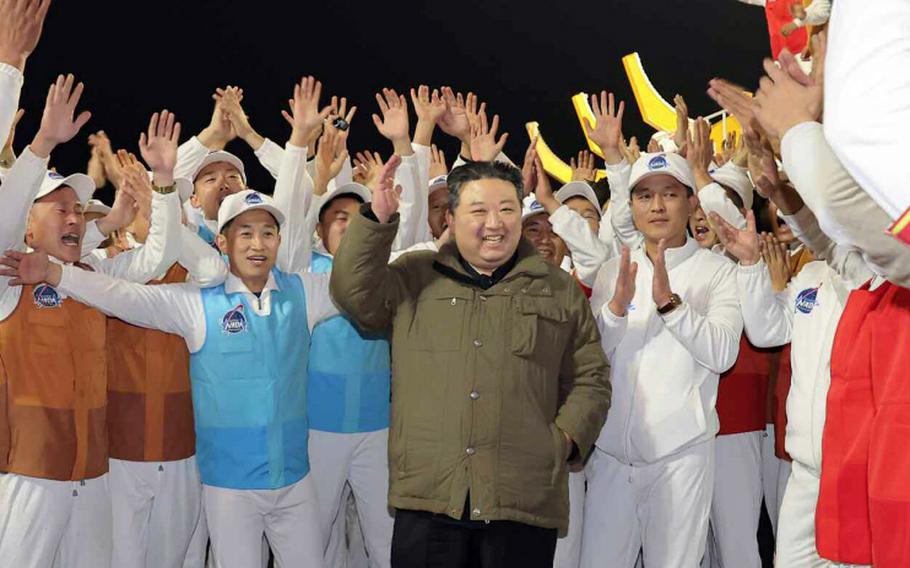
In this image released by the state-run Korean Central News Agency, North Korea launches its Chollima-1 rocket with a spy satellite aboard on Nov. 22. (KCNA)
CHEONAN, South Korea — Seoul is restarting aerial reconnaissance operations at the North Korean border, suspended since 2018, after Pyongyang launched a rocket carrying a spy satellite late Tuesday.
The move is related to a partial suspension of the Comprehensive Military Agreement that took effect at 3 p.m. Wednesday, Ministry of National Defense spokesman Heo Tae-keun said during a news conference that afternoon.
“North Korea’s behavior shows again that it has no will to comply with the agreement,” he said after a Cabinet meeting that included Prime Minister Han Duck-soo.
The accord was signed in 2018 by North Korean leader Kim Jong Un and then-South Korean President Moon Jae-in after summits in Pyongyang and the Demilitarized Zone. It established no-fly zones and prohibits armed troops at the border.
Senior South Korean military officials met early Wednesday to discuss preparations for partially suspending the agreement after the North fired a Chollima-1 rocket carrying a spy satellite at 10:43 p.m. Tuesday, according to the South’s Joint Chiefs of Staff.
Defense Minister Shin Won-sik, who presided over the meeting, emphasized that military readiness should be paramount if the deconfliction agreement is suspended, according to a news release from the ministry.
“Military action should be carefully prepared,” he said, adding that Seoul’s surveillance and response capabilities should be ready for further provocative acts by North Korea, according to the release.
“North Korea’s satellite launch is a clear violation of U.N. Security Council resolutions and a serious provocation against [South Korea] and the international community,” Shin added.

In this image released by the state-run Korean Central News Agency, North Korean leader Kim Jong Un celebrates the country’s launch of a rocket with a spy satellite aboard on Nov. 22. (KCNA)
With the suspension, fixed-wing aircraft are no longer prohibited from flying within 25-mile and 12-mile buffer zones on the Korean Peninsula’s eastern and western borders, respectively.
The revision also scraps a ban on unmanned aerial vehicles flying within nine- and six-mile buffers on those borders.
The change does not affect a prohibition on armed troops at guard posts along the border.
No further details about late Tuesday’s launch, including whether it was successful, were released by the Joint Chiefs.
North Korea’s state-run Korean Central News Agency reported Wednesday that the satellite was in orbit. Kim observed the launch and the country plans to launch additional satellites, according to KCNA.
The U.S. “strongly condemns” the launch, National Security Council spokeswoman Adrienne Watson said in a statement Wednesday.
Watson reiterated Washington and Seoul’s position that the North’s space launch vehicle used ballistic missile technology and was “directly related to [North Korea’s] intercontinental ballistic missile program.”
Pyongyang has been banned by the U.N. Security Council from conducting ballistic missile tests since 2006. The regime has fired 21 ballistic missiles in 14 days of testing so far this year.
“We urge all countries to condemn this launch and call on [North Korea] to come to the table for serious negotiations,” Watson said. “The door has not closed on diplomacy but Pyongyang must immediately cease its provocative actions and instead choose engagement.”
North Korea attempted two other satellite launches this year on Aug. 24 and May 31. Those ended in failure and South Korea’s military salvaged debris from the May launch in the Yellow Sea.